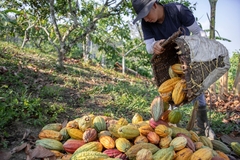
- Industry news
Industry news
- Category news
Category news
- Reports
- Key trends
- Multimedia
- Journal
- Events
- Suppliers
- Home
- Industry news
Industry news
- Category news
Category news
- Reports
- Key trends
- Multimedia
- Events
- Suppliers
Scientists find intervention technologies can’t save climate-sensitive crops
Key takeaways
- New research shows Stratospheric Aerosol Injection may slightly cool global temperatures but fails to stabilize rainfall or humidity critical to coffee, cacao, and wine production.
- Only one-third of studied regions showed any improvement under SAI, leaving most growers exposed to pests, diseases, and erratic weather.
- Scientists stress that resilient farming practices, region-specific adaptation, and global collaboration are key to securing the future of these high-value crops.

The climate impact across the coffee, chocolate, and wine sectors continues to pose challenges as extreme rainfall and high temperatures affect yields and quality. Despite agri-food stakeholders rallying to mitigate climate factors, a new study reveals that even advanced intervention strategies may not be enough to secure the future of wine grapes, coffee, and cacao.
Researchers questioned whether climate fixes would be enough to save these crops in the years to come. They examined Stratospheric Aerosol Injection (SAI) as a means of mitigating climate change in grape-, coffee-, and cacao-growing regions of Western Europe, South America, and West Africa.
SAI is a hypothetical solar geoengineering method that releases reflective particles into the stratosphere to cool the Earth’s surface, mimicking the natural cooling effects of volcanic eruptions.
Researchers investigated whether SAI could help stabilize growing conditions for the crops between 2036 and 2045. They modeled climate conditions across 18 crop-producing regions and analyzed whether SAI impacted temperature, rainfall, humidity, and disease risk.
Reducing temperature with SAI isn’t enough
Findings showed that SAI could slightly cool the planet, but it cannot stabilize the erratic rainfall and humidity that devastate crop yields and leaves farmers exposed to climate threats. Only six of the 18 regions studied showed any significant improvement compared to a future scenario without SAI.
“Reducing temperature with SAI alone isn’t enough,” says co-author of the study, Dr. Ariel Morrison, research scientist in the Department of Atmospheric Science at Colorado State University, US.
“For instance, cacao species, while more tolerant of hot temperatures than coffee and grapes, are highly susceptible to pests and diseases caused by a combination of high temperatures, rainfall, and humidity. Natural climate variability also cannot be ignored. It leads to a wide range of outcomes under the same SAI scenario that could affect the livelihoods of farmers growing cacao, coffee, and grapes.”
”SAI climate intervention may offer temporary relief from rising temperatures in some regions, but it is not a guaranteed fix for the challenges facing luxury crop farming. Adaptation strategies tailored to local conditions, investment in resilient agricultural practices, and global cooperation are essential to saving these crops and the communities that depend on them,” adds Morrison.











